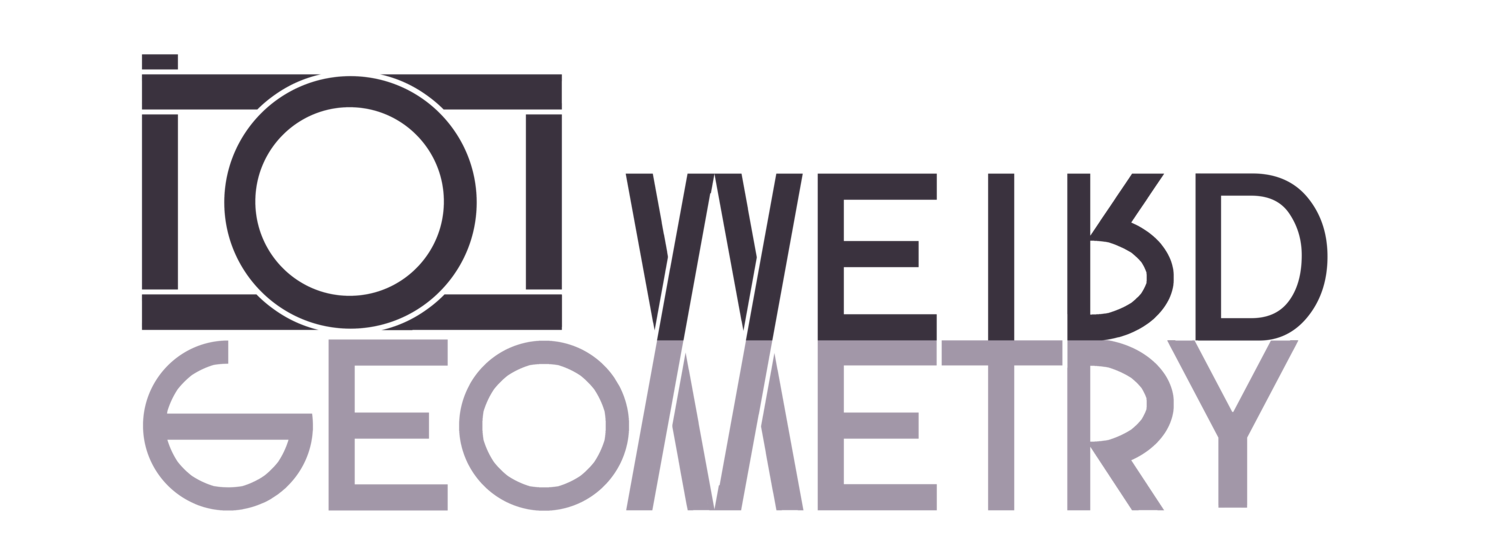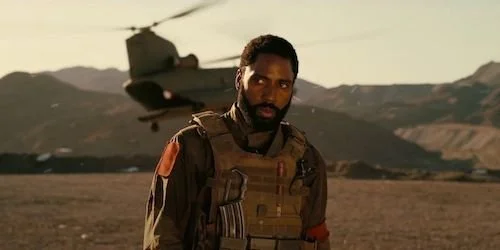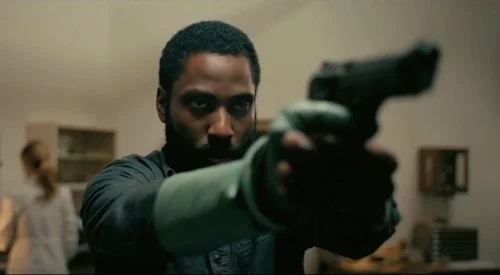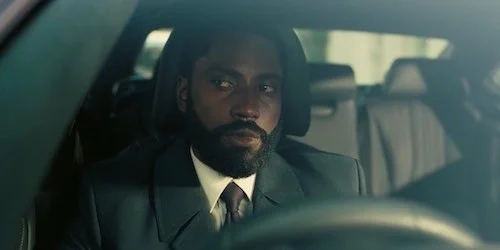Tenet: What Makes a Protagonist?
NOTE: “Tenet” is the title of the film, but also the name of a spy organization in the film’s story. For clarity, when italicized, “Tenet” refers to the film, when non-italicized, it refers to the org. Also, SPOILERS!!
When the unnamed protagonist of a feature film is referred to as a “protagonist” by another character, and refers to himself that way, and is listed in the credits as “The Protagonist,” it’s evident that the filmmaker is up to something that could be called “meta.”
John David Washington as “The Protagonist”
Such is the case with Christopher Nolan’s Tenet, which on the surface is just a James Bond riff with a time travel twist. Why, then, the odd choice when it comes to the lead’s lack of a name? It’s not unprecedented: Fight Club, Drive and other Hollywood thrillers have an unnamed protagonist, but in those films that detail could escape a casual viewer; whereas, in Tenet, the constant discussions about The Protagonist’s appellation could be described as fourth-wall-breaking. Early on, Dimple Kapadia’s shadowy arms dealer refers to the hero as a “fresh-faced protagonist,” a phrase that would sound hack in a film’s press kit, let alone spoken in earnest by an actual character on screen. Nolan is clearly prompting his audience to think of his Protagonist as a protagonist, but why?
The first thing we should do to get at what Nolan is up to is ask what exactly he means by “protagonist,” and I think the answer is clearly “action movie protagonist.” Nolan is referring to James Bond, Indiana Jones or John Rambo; not Pip, Raskolnikov or Atticus Finch. In Tenet, The Protagonist (John David Washington) is purposefully stripped of all characteristics except those which are standard for the hero of an action movie. His past is never mentioned, he has no relationships besides those which are developed over the course of the film. He’s free of the quirks that often specialize movie action heroes, like Tony Stark’s sense of humour or Peter Parker’s insecurity. All you can positively say about The Protagonist are the same things you could say about virtually any action hero: he’s a good fighter, runner, shooter; he’s handsome, extraordinarily charismatic and highly competent. He’s not so much a character as he is the distilled essence of the action protagonist, and that extends to the two traits which most define his personality: 1) altruism: his concern for saving lives; and 2) ambition: his desire to accumulate knowledge and power. These traits – the only traits The Protagonist exhibits in any significant way – represent the essential features of the action movie hero. Action heroes aren’t heroes if they don’t care about saving lives, and ambition is the expression, via personality trait, of perhaps the most fundamental characteristic of any action hero: that of being the audience proxy in a power fantasy.
When understanding action movie protagonists in their most distilled, essential form – which, I think, Tenet wants us to do – we must factor in the audience’s wish-fulfillment. Action movies are power fantasies, excuses to let our ids run wild: wouldn’t it be great to be the coolest, strongest, smartest guy around; to be able to defeat any opponent and to get to do so frequently (about 4-5 times every two hours)? For most of us, our daily obstacles are complicated and often insurmountable, but in action films, obstacles are embodied in villains whom we/the protagonist can easily mow down with a machine gun. Of course, a pure indulgence of the id would quickly grow too disturbing to be effective as wish fulfillment. As much as we want to get our rocks off with fantasies of violence, we usually don’t want to do so without losing a sense of our essential goodness. This is why action protagonists must be heroes: good guys who use violence to save people, or a woman, or the world (it usually doesn’t matter all that much). The perfect action movie protagonist means the perfect balance of power and goodness: a “hero” who will indulge the audience’s lust for power and violence, but who will always have a moral reason to do so. Protagonists who are too violent or power-mad become anti-heroes; heroes who are too nonviolent cease to be action heroes. In Tenet, The Protagonist’s personality is reduced to nothing but this dichotomy.
In an early scene, The Protagonist (who I’ll call ‘P’ from here on) has his gun drawn on an illegal arms dealer. When the dealer won’t answer P’s questions, P says “You’re an arms dealer, friend, this may be the easiest trigger I’ve ever had to pull.” This line perfectly illustrates the way action heroes indulge the audience’s power fantasy while keeping their sense of goodness intact. P’s cool confidence with doing violence is appealing to the id, but morally justified: he is guided by principles to only use violence against the people who deserve it. For the first half of Tenet, before we really understand the plot, P’s morality is like the north star guiding us through all the confusion. Whatever else is going on, P is signalled as the “good guy,” and that’s really all we need to understand to get into the action. Yet, by the final scene, an irresolvable tension is established between the altruistic and ambitious sides of P’s character, or, between the two definitive features of the action movie protagonist.
Tenet begins with a chaotic action sequence which does not become more intelligible on a second viewing, but which does effectively set up its hero’s altruism. P infiltrates a hostage situation in Ukraine in order to extract an informant of some kind. There’s a lot going on, but what’s important is that once P learns the local military plan to blow up the hostages, he sets his mission aside and risks his life to save theirs. When some allies betray, kidnap and torture him, P nearly dies because he won’t endanger his team. A refusal to sacrifice innocent lives is P’s tenet, and that’s what puts him on the radar of Tenet, a mysterious, non-governmental spy organization which recruits him to literally save the world.
The details of which world-saving are not hugely important to this essay, so I’ll try to make it quick. After connecting with Priya (Kapadia), a higher-up in Tenet, P is put on the trail of Sator (Kenneth Branagh), a Russian oligarch with access to a form of time travel. Sator is working for villains from the future whose goal is to reverse the flow of time, apparently because the state of things is so hopeless in the future that this is their only choice. Reversing the flow of time means unmaking the universe, so the stakes are pretty high. P and Sator are essentially the present-day proxies in a cold war between Sator’s future handlers and whoever is behind Tenet.
P is decidedly more altruistic than his colleagues. He recruits another spy, Neil (Robert Pattinson), but insists on keeping him in the dark for fear that Tenet will kill Neil for knowing too much. When he and Neil plan a heist that involves crashing an airliner, P makes Neil swear no lives will be endangered by the explosion. Later, P involves Sator’s oppressed wife Kat (Elizabeth Debicki), and she winds up nearly killed. Neil insists Kat’s life is lost, yet P spends much of the film’s running time risking bringing on the apocalypse to save her. P’s ethos is very Search for Spock: “The needs of the one outweigh the needs of the many.” Put differently, “you can’t save the world when you see even a single life as expendable.” This causes a brush between P and Tenet; he forces Priya to give her word not to get rid of Kat when Kat learns too much.
Through the first half of Tenet, P is singularly driven by altruism: in macro, he wants to save the world; in micro, he wants to save Kat. During this period, P sees his goals as being consistent with Tenet’s, but around the halfway point, P learns Tenet has been manipulating him. After he’s set up to fail in order to lure Sator into exposing himself, it becomes clear that P is just one piece in a larger plot which is beyond the grasp of anyone but the founders of Tenet, whom we never see (or do we…). In other words, it becomes clear that P doesn’t exactly live up to his namesake, a point driven home – as points in Nolan films usually are – by this dialogue exchange:
Priya: You’ve done your part.
The Protagonist: My part? I’m the protagonist of this operation.
Priya: You are a protagonist. Did you think you were the only one capable of saving the world?
The Protagonist: No... But I am.
He goes on to produce some plot point which is hard to remember, but which serves its purpose by placing P back at the centre of the story. Introduced here is P’s second major motivation: to be the protagonist of Tenet. The double meaning is obvious (perhaps a little too obvious): P wants to both: accumulate power / become the protagonist of the movie he’s in.
It’s here we should factor in audience identification. When Priya tells P he’s only “a” protagonist, I think P’s disappointment is meant to mirror the audience’s. P thought he was Tenet’s only protagonist, and we in the audience thought we were identifying with the most important person in Tenet, not just a manipulated pawn. With the power fantasy momentarily diminished, P’s lack of other characteristics becomes more salient. If P is not the protagonist, then who is he, and what have we been doing giving him our attention? Without much else to latch onto, is P’s altruism enough to relieve the sting of Priya’s line? P’s ambition for power is complicit with the audience’s wish to have its power fantasy undisturbed by such questions. Later, P’s ambition will be – to use a popular word – problematized.
A new theme is raised during the second half, that of free will versus predestination, and this theme is tangled up with P’s ambition for power. There are two kinds of time travel movies: ones where all of the events occur in one timeline, and ones where choices and events create multiple timelines across parallel universes. Tenet falls into the former category: when Person A travels back in time and makes a change, the consequences of that change had already reverberated through Person A’s future, even before Person A traveled back in time. Throughout, members of Tenet present this as an indisputable fact, but P brushes against it. He pitches solutions which involve going back in time and changing events that he’s already experienced, and he insists it’s possible even when Priya tells him “If that universe can exist, we don’t live in it.” P’s resistance to this view of the universe is linked to his resistance to being a pawn of Tenet: there’s the implication, throughout the second half, that events in the timeline have all been set in place, in the future, by Tenet, and P is performing actions which have been predetermined for him by his superiors. By imposing his will to change the timeline, P would also be reclaiming power over his life from Tenet. On a meta level, The Protagonist of Tenet doesn’t exactly like that he’s being ushered through a predetermined plot.
In a schmaltzier movie about fate and free will, you’d expect P to be proven right, to perform some independent action which changes the timeline and asserts the inspiring power of free will, etc, but that’s not the case here. P is wrong, Priya is right: he, and the other characters, are all stuck on one timeline, the events of which have been determined in advance by Tenet. You’d think, then, that this would diminish P’s power, diminish his efficacy as a figure of audience wish fulfillment… but then we arrive at the final twist. After Sator is defeated and the world saved, it’s revealed that P himself will go on to run Tenet, that P – in the future – was the mastermind who set everything in motion, which not even Priya understood. P’s resistance to being manipulated, to lacking power over his own life, has been relieved in a rather cynical way: he was a pawn, but his own pawn. That the other characters in the story will go on being P’s pawns hardly matters to him, or us in the audience, because what’s in store for P is absolute power.
Tenet ends with The Protagonist learning that the plot of Tenet/Tenet has been set up in advance, for his benefit, by himself, to place him at the centre of things. Nolan has a prevailing interest in solipsism: Memento ends with its antihero giving himself over to a world that only exists in his mind; Inception is about a man trying to escape such an existence. I’d argue Tenet fits this tradition, framing the prototypical action movie as a kind of solipsistic exercise. In the final scenes, as we learn that P has been behind everything all along, the world of Tenet shrinks. Tenet isn’t really a network of heroic spies that stretches into the distant future, Tenet is only The Protagonist. Retroactively, the suspense of the preceding scenes is diminished when we learn all of the elements at play were essentially dominoes set up in advance by The Protagonist. By the final scene, all we can really be sure of is that The Protagonist is behind Tenet and has set everything up in a way that puts him at the top of the ladder. Sure, Sator is evil, but can we be sure his doomsday weapon does what it’s supposed to do? All of the information pertaining to the weapon has been communicated by actors in Tenet who don’t even realize they’re working for The Protagonist. Are Sator’s handlers in the future actually evil? For all we know, Sator, like everyone else, has been receiving directives from The Protagonist himself. The never-seen villains’ motives, the doomsday weapon that’s obviously a MacGuffin, these are revealed to be exactly what they are: narrative devices that serve to put The Protagonist on top. The Protagonist conceived Tenet’s plot to give himself power. The narrative of Tenet is the dreamed world, and the solipsist dreamer is The Protagonist – is us, the audience member having a power fantasy.
The final scene finds Priya and her henchman waiting in a car to assassinate Kat, now that Kat has learned of Tenet. The Protagonist materializes in the backseat, kills Priya’s henchman, and then, after some dialogue, kills Priya. It’s pretty notable for a post-Batman Begins, always-PG-13 Christopher Nolan to end a film with the supposed hero murdering a sixtysomething woman. Since Begins, women don’t experience much harm in Nolan’s films; when they die, it’s either depicted as tragedy (The Prestige, The Dark Knight) or, in the odd case of a female villain, as an unwanted last-resort during an action sequence (The Dark Knight Rises). The final scene of Tenet is quite different. Yes, Priya was intending to kill Kat, but until this point in the story Priya has been portrayed as a mostly friendly, mentor-like figure, and once her henchman is killed, she poses no physical threat. Priya is only carrying out her duties as she understands them; duties which, since he’s in charge, The Protagonist could change if he wanted to. Here is the exact dialogue before The Protagonist kills Priya:
Priya: I had to tie up the loose ends.
The Protagonist: That was never your job.
Priya: And whose was it?
The Protagonist: Mine. I realized I wasn’t working for you. We’ve both been working for me. I’m the protagonist.
Priya: And you bloody tie up those loose ends.*
Bang. From the dialogue, it seems The Protagonist is killing Priya more as an expedient to his plot than to protect Kat. In other words, his reasons for killing Priya are hardly altruistic. After he kills her, tears well in his eyes, but his face is blank, like he’s forcing himself not to feel anything. The tone of the scene is ambivalent, to say the least. The music is droning and ominous, and Washington’s performance is a little harder, a little colder than it has been until this point. It’s unclear how much time (in either direction) has passed, for The Protagonist, between this final scene and everything that’s come before, but it seems like he’s changed. What we can say for sure is that he’s assumed his role as the head of Tenet, that he’s attained the power which he’s sought throughout the film.
The last lines we hear are provided, in voice over, by Neil: “It’s the bomb that didn’t go off, the danger no one knew was real, that’s the bomb with the real power to change the world.” It’s clear the dialogue is referring to The Protagonist, who’s gained that power, but who’s done so at the cost of his only tenet: to protect human life. With power comes power over other people, who he’s now willing to kill for his own ends. The action movie protagonist’s ambition for power ultimately wins out over his altruism, and the moment this happens is the moment he lives up to his name. “I’m the protagonist,” is the last thing he tells Priya before he kills her.
So, what is a protagonist, in an action movie like Tenet? Is a protagonist a hero, someone who will always do the right thing? Or is a protagonist, and the narrative world which produces a protagonist, simply a fabrication meant to provide a fantasy of absolute power? Which is more fundamental? Can the two answers coexist within the same concept? The ambivalence of Tenet’s final moments produces these questions.
*Okay, this last line of Priya’s is pretty hard to make out, but my transcription is about 80% right.



